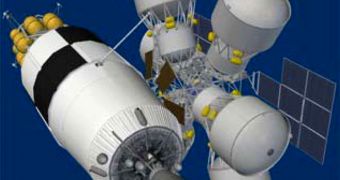Officials at the American space agency announce that they will provide a $200 million research fund for the development of studies dealing with the creation of orbital refueling stations. Such structures are truly important if we are to move forward in space exploration.
These stations could be critical for future missions to the Moon and Mars. In addition to extending the range of spacecraft, they would also allow engineers to design lighter rockets, capable of carrying less fuel and more cargo.
This would in turn enable cheaper launches or put together constructs like the International Space Station (ISS) faster than currently possible. Nevertheless, there are currently no studies detailing how this can be done feasibly, Space reports.
This is why NASA decided to set in, and fund such investigations with the $200 million. The main objectives of the research the agency calls for is for experts to determine the best possible way of storing and transferring rocket fuel in space.
At this point, some private companies already have plans to put refueling satellites in Earth's orbit by 2015, but what NASA is looking for is the creation of an outpost that would be able to refuel large manned, spacecraft and not just small satellites.
Given the rich history of the Space Shuttle Program, and the success of private rockets using the same type of fuels, the agency decided to focus its attention on liquid oxygen and liquid hydrogen, as the two main types of propellants that would need to be stored on the future facilities.
The new refuel stations will need to be capable of “zero boil-off storage” of liquid oxygen, and “minimal boil-off storage” of liquid hydrogen. In the latter case, the main challenge is keeping the fuel at a temperature of below minus 423 degrees Celsius, Space reports.
Another of the main challenges that science team will have to face is developing a way of moving the material from the station to a spacecraft, considering that the transfer will take place in zero gravity.
Experts at the space agency say that private companies could also benefit from the refueling stations as well. This is the case for Hawthorne, California-based Space Exploration Technologies Corporation (SpaceX), which currently holds NASA contracts to resupply the ISS through 2015.
But the SpaceX CEO, Elon Musk, made it clear on numerous occasions that his company is also targeting the Moon, or perhaps even Mars. In order to get there, new spacecraft would have to be developed, and the orbital refueling stations may play an important role in supporting them.

 14 DAY TRIAL //
14 DAY TRIAL //